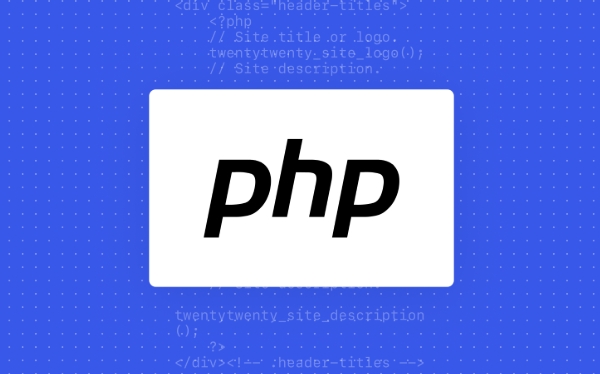Optimizing Memory Usage for Large-Scale Indexed Arrays in PHP
Aug 02, 2025 pm 02:00 PMUsing generators, block processing, timely release variables, optimize data types and avoid sparse arrays can significantly reduce the memory usage of PHP large arrays. The specific strategies are based on priority: 1. Use generators to produce data one by one to keep memory constant; 2. Process big data in batches, loading only a part at a time; 3. Unset large variables immediately after processing is completed; 4. Replace strings with integers and reduce redundant data to reduce single-element overhead; 5. Avoid creating sparse arrays to prevent internal memory waste; 6. Monitor memory usage through memory_get_usage; ultimately, combine generators and iterative processing to achieve sustainable low memory consumption. This method is suitable for data-intensive scenarios such as log analysis and ETL and can effectively prevent memory overflow errors.

When working with large-scale indexed arrays in PHP, memory usage can quickly become a bottleneck—especially in data-intensive applications like batch processing, log analysis, or ETL operations. PHP's default behavior of loading entire arrays into memory can lead to high memory consumption and script failures (eg, "Allowed memory size exhausted"). Optimizing memory usage requires a combination of smart data structures, efficient iteration, and awareness of PHP's internal mechanisms.

Here are key strategies to reduce memory footprint when handling large indexed arrays:
1. Use Generators instead of Arrays
One of the most effective ways to reduce memory usage is replacing traditional arrays with generators . Generators yield values one at a time, avoiding the need to store the entire dataset in memory.

function getLargeDataset() {
for ($i = 0; $i < 1000000; $i ) {
yield $i => "value_$i";
}
}
foreach (getLargeDataset() as $key => $value) {
// Process each item without loading all into memory
echo "$key: $value\n";
}- ? Memory usage stays low (typically under a few MB).
- ? You can't access elements by index randomly or count the total without iterating.
Tip : Use generators when you process data sequentially and don't need random access.
2. Process Data in Chunks
If you must use arrays, avoid loading everything at once. Use chunked processing with array_chunk() or stream-based input.

$largeArray = range(1, 1000000); // This already uses a lot of memory
$chunks = array_chunk($largeArray, 10000);
foreach ($chunks as $chunk) {
// Process 10k items at a time
foreach ($chunk as $item) {
// Handle item
}
// $chunk is freed after each iteration
}Alternatively, read from files or databases in batches:
$handle = fopen("data.csv", "r");
while (($row = fgetcsv($handle)) !== false) {
// Process one row at a time
}
fclose($handle);- ? Keeps memory predictable.
- ? Works well with external data sources.
3. Unset Unused Variables Early
PHP's garbage collector doesn't always free memory immediately. Explicitly unset() large arrays when no longer needed.
$bigArray = range(1, 500000); // ... process ... unset($bigArray); // Free memory now // Don't just let it go out of scope—explicit is better
Also avoid keeping unequissary references:
$result = [];
foreach ($bigArray as $item) {
$result[] = transform($item);
}
unset($bigArray); // Free source data
// Continue with $result only4. Optimize Array Structure and Data Types
Indexed arrays in PHP are actually ordered hash maps (internally, HashTable ), so they consume more memory than simple C-style arrays.
- Avoid storing redundant or overly large values.
- Use integers instead of strings when possible.
- Consider encoding data (eg, JSON, serialized) only when necessary.
Example: Storing 1 million integers as strings uses significantly more memory than as integers.
$ints = range(1, 1000000); // ~64 MB $strings = array_map('strval', $ints); // ~100 MB
Also, avoid "sparse" arrays (eg, setting $arr[999999] = 1; without filling the gaps)—PHP may allocate memory for all indices in between, depending on internal structure.
5. Increase Memory Limit Judiciously
While not a real optimization, adjusting memory_limit in php.ini or via ini_set() can help during development or one-off scripts:
ini_set('memory_limit', '512M');
But this is a workaround, not a solution. Aim to reduce usage instead of increasing limits.
6. Monitor Memory Usage
Use PHP's built-in functions to profile memory consumption:
echo "Current: " . memory_get_usage() . " bytes\n"; echo "Peak: " . memory_get_peak_usage() . " bytes\n";
Place these before and after critical sections to identify memory hogs.
Summary
| Strategy | Memory Benefit | Use Case |
|---|---|---|
| Generators | ????? | Sequential processing |
| Chunked processing | ???? | Large arrays from DB/file |
| Unset variables | ??? | Mid-script cleanup |
| Optimize data types | ??? | Reduce per-element cost |
| Avoid sparse arrays | ?? | Prevent hidden allocation |
For truly large datasets, consider moving to a database (eg, SQLite for local), or using external tools like Redis or streaming parsers. But for pure PHP, combining generators with chunked, iterative processing is the most sustainable path.
Basically: don't load it all—process it piece by piece.
The above is the detailed content of Optimizing Memory Usage for Large-Scale Indexed Arrays in PHP. For more information, please follow other related articles on the PHP Chinese website!

Hot AI Tools

Undress AI Tool
Undress images for free

Undresser.AI Undress
AI-powered app for creating realistic nude photos

AI Clothes Remover
Online AI tool for removing clothes from photos.

Clothoff.io
AI clothes remover

Video Face Swap
Swap faces in any video effortlessly with our completely free AI face swap tool!

Hot Article

Hot Tools

Notepad++7.3.1
Easy-to-use and free code editor

SublimeText3 Chinese version
Chinese version, very easy to use

Zend Studio 13.0.1
Powerful PHP integrated development environment

Dreamweaver CS6
Visual web development tools

SublimeText3 Mac version
God-level code editing software (SublimeText3)
 PHP Variable Scope Explained
Jul 17, 2025 am 04:16 AM
PHP Variable Scope Explained
Jul 17, 2025 am 04:16 AM
Common problems and solutions for PHP variable scope include: 1. The global variable cannot be accessed within the function, and it needs to be passed in using the global keyword or parameter; 2. The static variable is declared with static, and it is only initialized once and the value is maintained between multiple calls; 3. Hyperglobal variables such as $_GET and $_POST can be used directly in any scope, but you need to pay attention to safe filtering; 4. Anonymous functions need to introduce parent scope variables through the use keyword, and when modifying external variables, you need to pass a reference. Mastering these rules can help avoid errors and improve code stability.
 How to handle File Uploads securely in PHP?
Jul 08, 2025 am 02:37 AM
How to handle File Uploads securely in PHP?
Jul 08, 2025 am 02:37 AM
To safely handle PHP file uploads, you need to verify the source and type, control the file name and path, set server restrictions, and process media files twice. 1. Verify the upload source to prevent CSRF through token and detect the real MIME type through finfo_file using whitelist control; 2. Rename the file to a random string and determine the extension to store it in a non-Web directory according to the detection type; 3. PHP configuration limits the upload size and temporary directory Nginx/Apache prohibits access to the upload directory; 4. The GD library resaves the pictures to clear potential malicious data.
 Commenting Out Code in PHP
Jul 18, 2025 am 04:57 AM
Commenting Out Code in PHP
Jul 18, 2025 am 04:57 AM
There are three common methods for PHP comment code: 1. Use // or # to block one line of code, and it is recommended to use //; 2. Use /.../ to wrap code blocks with multiple lines, which cannot be nested but can be crossed; 3. Combination skills comments such as using /if(){}/ to control logic blocks, or to improve efficiency with editor shortcut keys, you should pay attention to closing symbols and avoid nesting when using them.
 How Do Generators Work in PHP?
Jul 11, 2025 am 03:12 AM
How Do Generators Work in PHP?
Jul 11, 2025 am 03:12 AM
AgeneratorinPHPisamemory-efficientwaytoiterateoverlargedatasetsbyyieldingvaluesoneatatimeinsteadofreturningthemallatonce.1.Generatorsusetheyieldkeywordtoproducevaluesondemand,reducingmemoryusage.2.Theyareusefulforhandlingbigloops,readinglargefiles,or
 Tips for Writing PHP Comments
Jul 18, 2025 am 04:51 AM
Tips for Writing PHP Comments
Jul 18, 2025 am 04:51 AM
The key to writing PHP comments is to clarify the purpose and specifications. Comments should explain "why" rather than "what was done", avoiding redundancy or too simplicity. 1. Use a unified format, such as docblock (/*/) for class and method descriptions to improve readability and tool compatibility; 2. Emphasize the reasons behind the logic, such as why JS jumps need to be output manually; 3. Add an overview description before complex code, describe the process in steps, and help understand the overall idea; 4. Use TODO and FIXME rationally to mark to-do items and problems to facilitate subsequent tracking and collaboration. Good annotations can reduce communication costs and improve code maintenance efficiency.
 Quick PHP Installation Tutorial
Jul 18, 2025 am 04:52 AM
Quick PHP Installation Tutorial
Jul 18, 2025 am 04:52 AM
ToinstallPHPquickly,useXAMPPonWindowsorHomebrewonmacOS.1.OnWindows,downloadandinstallXAMPP,selectcomponents,startApache,andplacefilesinhtdocs.2.Alternatively,manuallyinstallPHPfromphp.netandsetupaserverlikeApache.3.OnmacOS,installHomebrew,thenrun'bre
 How to access a character in a string by index in PHP
Jul 12, 2025 am 03:15 AM
How to access a character in a string by index in PHP
Jul 12, 2025 am 03:15 AM
In PHP, you can use square brackets or curly braces to obtain string specific index characters, but square brackets are recommended; the index starts from 0, and the access outside the range returns a null value and cannot be assigned a value; mb_substr is required to handle multi-byte characters. For example: $str="hello";echo$str[0]; output h; and Chinese characters such as mb_substr($str,1,1) need to obtain the correct result; in actual applications, the length of the string should be checked before looping, dynamic strings need to be verified for validity, and multilingual projects recommend using multi-byte security functions uniformly.
 Learning PHP: A Beginner's Guide
Jul 18, 2025 am 04:54 AM
Learning PHP: A Beginner's Guide
Jul 18, 2025 am 04:54 AM
TolearnPHPeffectively,startbysettingupalocalserverenvironmentusingtoolslikeXAMPPandacodeeditorlikeVSCode.1)InstallXAMPPforApache,MySQL,andPHP.2)Useacodeeditorforsyntaxsupport.3)TestyoursetupwithasimplePHPfile.Next,learnPHPbasicsincludingvariables,ech






